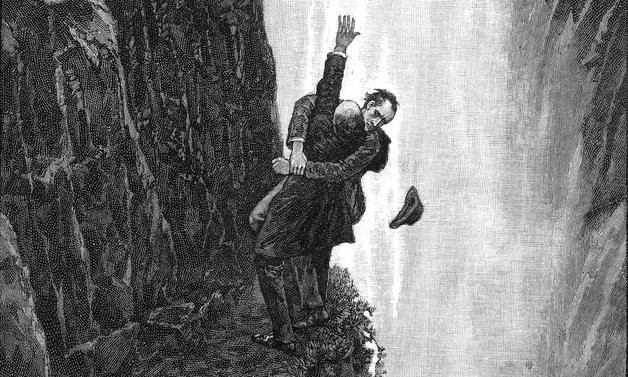Right-thinking people everywhere have a lot to get worked up about concerning the state of the world at large: political unrest, religious persecution, climate change, how confusing Instagram is, the delay in Jonathan Franzen’s new novel, the fact that Jonathan Franzen is writing a new novel, etc. But the one thing that not enough people are worried about is this: that people still think that Sherlock Holmes’ return from the dead is a straightforward allegory of the resurrection of Christ at Easter.
But you might be wondering: if Holmes rising from the abyss of Reichenbach Fall is not supposed to represent Christ rising from the grave, what is going on with his dramatic return to Baker Street? An excellent question, and one that can be solved by attending closely to the details of the matter at hand.
Now what is the first and most obvious fact that captures our attention when Holmes reveals himself to Watson after approaching him in the guise of an ill-tempered bookseller? Clearly, it’s that Holmes didn’t die after all, because here he is, roaming his way through the streets of London in disguise. And yet ordinary folk like us were meant to think he had died, while only the elite knew the truth. We should note that in the canonical text (“The Adventure of the Empty House”), this just means Mycroft, of course; a text was recently discovered (circulating under the title “The Empty Hearse”) that claimed the group of cognoscenti was significantly larger, but despite the extensive coverage BBC, PBS, and even Netflix have given to this work, basic dating problems identify it clearly as a non-canonical text produced by a later community, intended primarily for devotional purposes.
Holding these facts in mind, we now turn to the way in which Holmes makes himself known to Watson, and through Watson, us. In persona bookselleris, he proposes a curious series of books to our attention: first The Origin of Tree Worship, then three disparate books presented as a trilogy—British Birds, Catullus, and The Holy War. Now clearly the first places us in the topos of Christianity; we are being shown that a narrative of Christian history is about to begin, in which the origin of man’s worship of the tree/cross is to be set forth. But this much is obvious. What are we to do with the unlikely trilogy that follows?
Taken together, the three books create a suspiciously uniform and off-color vision of Christianity: British Birds obvious refers to those odd birds who have dotted the British isles through the course of the Church’s history (William of Ockham, John Wycliffe, Thomas Hobbes); Catullus avers to the awkward fact that the oldest manuscript of his often raunchy classical poems was confiscated by a bishop from a monk because it was ungodly, but then kept as a treasured possession and copied by other monks; and as for The Holy War, while contemporary readers may see an allusion anachronistically to Holy Blood, Holy Grail or The DaVinci Code, given the period this most likely refers to the religious conflict sparked by Joseph Smith’s Mormon movement (itself the subject of a more complete treatment in A Study in Scarlet).
So what are we to make of this lurid tale of dangerous ideas, moral weakness, and schism? Are we to be scandalized that the supposedly resurrected Holmes/Christ has made himself known to Watson as the progenitor of a church such as this?
Here at last, then, we come to the heart of it: the very wrongness of the story is the key. Holmes is not a symbol of the risen Christ, but is dramatically enacting the life, death, and afterlife attributed to Jesus by early heretical sects, notably some schools of Gnosticism and the Docetists. These groups claimed that Jesus did not really die on the cross, but only seemed to, for people who weren’t in the know. The fruit of belief in this religion of secrets and seeming was chaos and loss, a life without the sweet guidance of grace.
This is Holmes’ master performance: he’s showing what a notion of Jesus Christ’s death and resurrection would look like if Jesus wasn’t God and grace wasn’t real. The result is absurd, a mixed-up jumble of deceit, weakness, and dissension (birds, erotica, and war), a result we share in by our turning away from God’s grace, whether we do so for the same reason as the Gnostics or for our own less exalted reasons.
Holmes’ brilliant impersonation of a false resurrection and the subtle wrongness of a life built on it is a via negativa of the life of grace, pointing past himself to the radiant fullness of the Messiah who is truly risen, Jesus Christ. And this, as Holmes himself says, “will justify a man’s life on this planet.”
✠
Image: Sidney Paget, Sherlock Holmes and Professor Moriarty at the Reichenbach Falls







